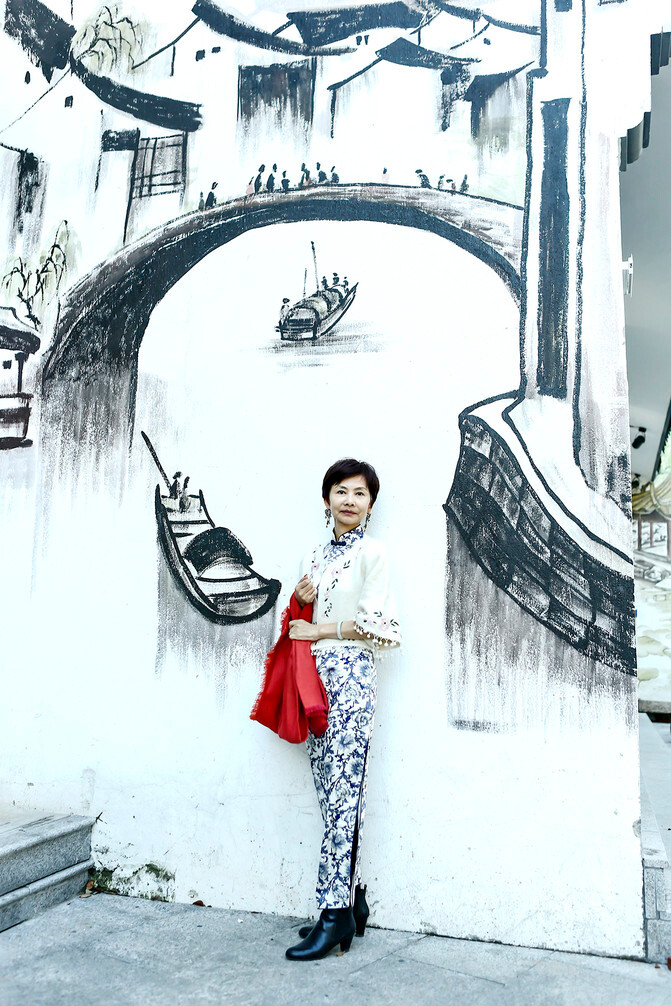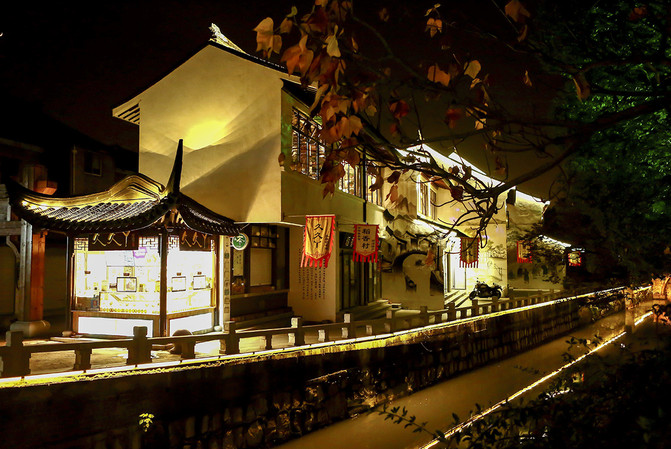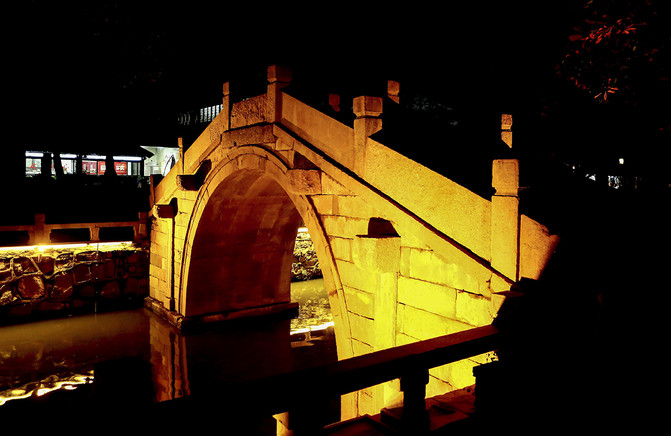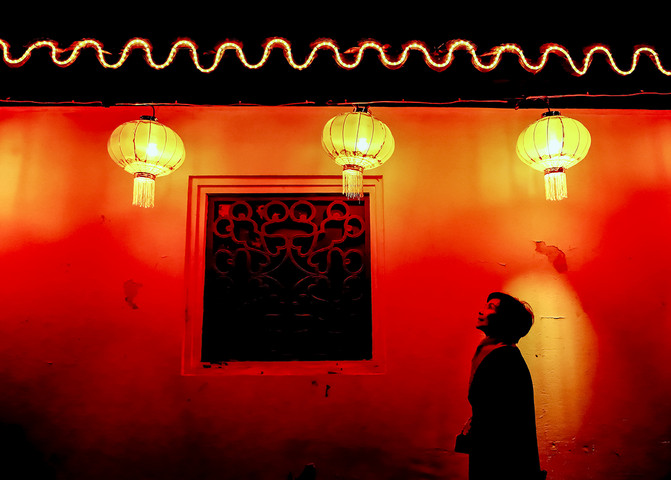The prosperous picture of Suzhou begins in Mudu-a night tour of Mudu
The "Prosperity of Suzhou" painted by Qing Dynasty painter Xu Yang depicts the prosperous Suzhou more than 200 years ago. "The prosperous picture of Suzhou begins in Mudu." Half of the entire picture depicts the ancient town of Mudu. It turns out that Mudu's vicissitudes and depth are like a pot of vintage wine. You need to drink carefully and slowly to feel its eternal charm. In order to find the wooden reading in Mr. Shen Congwen's works, I traveled through 2500 years of historical smoke and clouds to enter "The Prosperity of Suzhou".

Mudu Ancient Town has the saying of "Nine-mile Thirteen Bridges". Among the thirteen bridges, the most famous one is the Xie Bridge. "Slant Bridge Dividing Water" is one of the ten scenic spots in Mudu.
The inclined bridge is the intersection of Xujiang River and Xiangxi River. Xujiang River is my country's first artificial river. It connects Suzhou in the east and Taihu Lake in the west. It has an open water surface and runs across the town. It is a golden waterway connecting Taihu Lake and Suzhou City; Xiangxi, winding all the way from Lingyan Mountain, comes from the front of Lingyan Mountain, where two famous waters merge at the inclined bridge. Strangely enough, the water of Xiangxi is clear and the water of Xujiang is turbid, forming a clear watershed under the inclined bridge, just like beautiful women and heroes standing side by side, meeting here and blending together to interpret Mudu's atmosphere. The highest realm of grace and grace.

I stood on the Zhuxiang Bridge and looked at the two streams of water, clear and turbid, slow and rapid, colliding under the inclined bridge. The collision sound was like the low singing of the Xu River. I only became turbid after Wu Zixu committed suicide for injustice. Xiangxi is singing lightly, and only when Xishi is bathing can I have Xiangxi.

It turns out that the two rivers of water are equally clear. Legend has it that after Wu Zixu died, his body was packed in Chiyi Ge and thrown into the Xu River. On that day, there was a strong wind and rain and the river rose sharply. Wu Zixu's body actually flowed into Taihu Lake from east to west. After the wind and waves subsided, the originally clear river water appeared a little muddy yellow. Compared with the Xiangxi River flowing out of the Wu Palace, it was clear and turbid, and a clear watershed was formed at the intersection. The common people all said that the muddy yellow river was dyed by Wu Xiangguo's unwavering resentment. He would not be willing to join the flow of Yue even after his death. The Mudu people at the foot of Lingyan witnessed this historical tragedy and carved such a bridge on the Zhuxiang Bridge across the Xujiang River: "Wu and Yue have been separated for thousands of years, and the two rivers of Xiangxu and Xuzhou meet first-class.”

Walking dozens of steps down the Zhuxiang Bridge will reach the inclined bridge built on Xiangxikou; walking east of the inclined bridge and dozens of steps west will reach the Caijia Bridge. Walking around several river sides, there are seven ancient bridges within a hundred meters. After walking through Caijia Bridge and heading west along Shantang Street, there are Lufei Bridge, Xishi Bridge, Wangjia Bridge and Yong 'an Bridge in turn.

At dinner time, I walked into the old street again from the east entrance of Shantang Street. At this time, there were few tourists shuttling through the ancient shed corridor and arriving at Gusu 12Niang Commercial Street. The street was full of commercial signs, including live mussel picking beads, freshly ground pearl powder, Taihu Silk, Li Xiufang and other shops that run Taihu characteristics, as well as century-old shops such as Yupinzhai, Tiansheng Yuanpine Seed and Jujube Sesame Cake, Maltose Dragon Shush Crispy and other Suzhou traditional food.

As dusk fell, the ancient town that had receded from the crowd regained its original appearance. The commercial street that had been bustling for a day quieted down. Some shops had already been hung with black and red door panels. Shops that had not installed boards turned on lights, and the warm lights hit the narrow alleys, with unique flavor in light or dark, and the owner leisurely waited for his own business.
Narrow alleys, rough stone roads, rows of shops, fluttering wind flags, hanging lanterns... They are all telling their own stories.

Some people say that Mudu was a beautiful woman who made her famous. This is true. From the end of the Spring and Autumn Period, Fuchai, King of Wu, pleased the beautiful beauty Xi Shi, and the name Mudu was named after "Building Blocks"; to the Qing Emperor Qianlong's love for Mudu's best daughter; Then go to Gusu 12Niang, boat Niang, weaving Niang, embroidery Niang, tea Niang, fan Niang, lantern Niang, qin Niang, silkworm Niang, flower Niang, song Niang, painting Niang, and clam Niang. The 12Niang are typical representatives of Wu women. They are hard-working and kind, and their ingenuity condense the exquisite and profound historical connotation of the Wu culture of 2500 years. They are the shameful treasure of Wu culture and the epitome of the prosperity of commerce and handicrafts in paradise Suzhou.


Among the 12 women in Suzhou, Zhongxiu Niang is the most typical. Su embroidery ranks first among the four famous embroideries in China. Only when I came here did I realize that Mudu is the birthplace of Su embroidery. Because three generations of Suzhou embroidery masters since the Embroidery Saint Shen Shou have all forged an indissoluble bond with Mudu, and they used their skillful hands such as orchid to create brilliance for Mudu's craftsmanship.

"There is more than a year" has beautiful patterns, elegant colors, clever concepts, meticulous embroidery, and lively stitches. A lotus meets a fish and plays in the water. A cute kitten on the ground seems to smell the smell of fish, waiting like an elf. Her love, no matter how you come or go, never abandon, look, this is true love. In fact,"More Than Every Year", a vivid treasure in the town store, is loved by everyone.

There are shops next to each other, exquisite handicrafts, including embroidery by embroiderers, silk scarves by silkworm mothers, pearls by clam ladies, etc. There is no gorgeous decoration here but it gives you rich feelings.

Fan Niang's paper fans are also worth a book among Suzhou's handicrafts. Suzhou's palace fans, folding fans and sandalwood fans are exquisite and exquisite in workmanship, and have always been indispensable treasures in the hands of literati and literati. Fan Niang carved carefully in a small world, concentrating and depicting the mountains, rivers, flowers and birds characters of Wu. Her superb craftsmanship itself constitutes a gorgeous and colorful chapter in Wu culture.

The oil-paper umbrella is a symbol of the misty rain in the south of the Yangtze River, giving special feelings to the ancient towns in the south of the Yangtze River. Maybe it's because I have Jiangnan blood flowing in my body, and I like the hazy haze of apricot blossoms and misty rain in my bones. I really hope that it will rain at this time, buy an oil-paper umbrella to play the lilac girl under the umbrella, and cross the narrow alleys of the sloping streets. One by one, one by one, cross the warm stone bridge, stand in the rain and watch the wupeng boats passing through the water, feel the tranquility of the small bridge and flowing water; stroll on the stone road polished by the years, enjoy the tranquility of the calm and casual.

Walking out of the alley and coming to Shantang Street, there are a bridge across the winding water. There are few people and few lights. The Xishi Bridge is graceful and graceful. This is exactly the following: "The Spring and Autumn Dynasties were divided into two powers, and the Yue women were innocent and sacrificed their husbands. Gou Jian has avenged his hatred for subjugation, and Huanxi sand can still be seen in Wu."

"When you came to Gusu, people slept on the river. There is little idle land in the ancient palace and many water ports and small bridges." I stood on the Xishi Bridge and looked around. The long smoke and water spread into the distance in the dusk. The dim light reflected in the water. The houses with blue tiles and white walls on both sides of the river had changed into night clothes, rows of rows neatly leaned against the water. Sleep, the water reflected the old house, and the house shone on the water, like a gentle and quiet Xiangxi woman extending my dream.

Strolling along Shantang Street, which has a history of 2500 years, I look at the Xiangxi lying next to the street, filled with incense from thousands of years of cultural connections. The night is like a calm and soft scroll of history, vividly depicting the history of Mudu. History,"Beautiful people have bathed here, and their soul is fragrant. Poor Qinglong Spring, wearing this charming makeup. If you don't wash a man's clothes and dust, who can compare to a clear soup? Only now that the Baolin is opened, the source of Caoxi will be longer."

Small bridges, running water, and people are dreamy and deep in Mudu's heart. Jiangnan is like a dream, and it will always remain in everyone's heart like a dream. How many people traveled in a hurry and met between the mountains and rivers, ferrying from this embankment with maple and willow trees to the bank where fireworks flew. Those who have been to this affectionate place have begun to have concerns in their originally indifferent hearts.

Every courtyard in Mudu hides an exquisite, elegant, winding and deep world. Every door is carved with the story behind time. Throughout the ages, vicissitudes have changed... Opening a door and opening a window in this silent night, you who come with stories will also leave with stories.


The corridor of the ancient town is dimly lit, and the row of red lanterns is like a film of life. The lights are on and off, the closed door panels, the silence of pedestrians shuttling back and forth, and facing each other across the river is like traveling through time and space. Perhaps this is the life of Mudu built with small bridges and running water. It is heart-breaking and exquisite, making people easily fall into inattention. In the flashy and scattered night, looking at the dimly lit lights on both sides of the bank, swaying between the running water, it seems like the beauty of each other that we have known for a long time, and we have expressed endless feelings.


The warm and soft orange-yellow light is most suitable for narrative in the time of tea. The artistic atmosphere of Junpintang revitalizes the life of the ancient town that has flowed for thousands of years, and makes Mudu at night a blend of poetry and agility.

Mingyue Ancient Temple has an apricot yellow exterior wall among the white walls and black tiles along the way. It is particularly eye-catching under the light. There are two majestic stone lions in front of the door. The leaves of the two ginkgo trees are still golden in early winter. The ancient temple was built in the Later Tang Dynasty, renovated in the Guangxu Dynasty, and was destroyed during the Cultural Revolution. It was restored and opened to the public in 1993. The ancient temple, which has been reborn many times, is still solemn, giving people a feeling of admiration.


The moonlight is as cold as water flowing, and the heart is as calm as a lotus in the night. It is the Sanskrit sound of the ancient temple. It is only after five hundred years of looking back that I have met Mudu and the ancient temple. This is fate.

With the dense night wind flowing, I stopped and stopped, wandering in other people's stories, and relieved in universal feelings. "Time is like water, a fleeting glance, but how many years are underestimated; I miss your heart thousands of times, and the sky is between you and me." Sit down and enjoy the tranquility of the time when you admire Mudu, and quietly enjoy the tranquility of this soul.
A few red lanterns and a touch of warm light make Xiangxi Pavilion look gentle and leisurely, making people intoxicated.

There are simple streets and deep alleys with few pedestrians, but the street lights on both sides project orange light, making the early winter night feel warm. There are many famous old houses in the town, including Shen Deqian, a teacher of Qianlong, Xu Shiyuan, a literati of Mudu, Feng Guifen, a famous political commentator who pioneered the Westernization Movement, and Mr. Yan Jiagan, a Taiwanese politician... At the end of the Qing Dynasty and the beginning of the Republic of China, the residences of the "four major families" of Yan, Cai, Zheng and Xu in Mudu extended from Hongqiao to Wangjiaqiao, stretching for several miles, occupying almost the entire Shantang Old Street.

After five hundred years of ups and downs, the Yong 'an Bridge is still as stable as a rock. The stone inscriptions of Wang Shaomu's poems in the Qing Dynasty are waiting by the bridge: "On the Yong' an Bridge, we wish Chang 'an, and people go back and forth. The broken willows should sing three songs, and the vast smoke waves recall the countryside." The bridge is covered with green vines under the illumination of the lights, like an old man of time, with stories lost in the years hidden in his long beard.
I stood under the bridge and listened quietly to "The boat blows flute and the rain drizzles at night, and people talk about the bridge beside the station." The gurgling water was floating in the small tune of Wu Ge sung by the boatwoman. The boatwoman gently rocks the boat and slowly floats into the painting...

In a trance, I heard "Yumiji asked you to come for dinner","Yumiji asked you to come for dinner"... The melody of Wu Nong's soft language is like a long-awaited relative calling you home for dinner. Only then did I remember that my friends were still waiting for you there.

Fragrance spans the nine-mile thirteen bridges, with clothes floating among pavilions, pavilions, corridors and pavilions, and gently step on the yellow scroll of history that is glowing with the luster of time in the shadows of light-spotted willows to taste the thousand-year civilization and prosperity, vicissitudes and changes, tranquility and tranquility of Mudu... The simple atmosphere, the rich culture, everything seems like a world away, the steps are like a dream, the frozen picture, the hazy touch, like poetry, and the picturesque scenery.

Previous Article:Montreux (China) Jazz Festival and partners start a music journey in 2023
Next Article:Suzhou's Four Seasons: Making a Cheongsam for a Year
